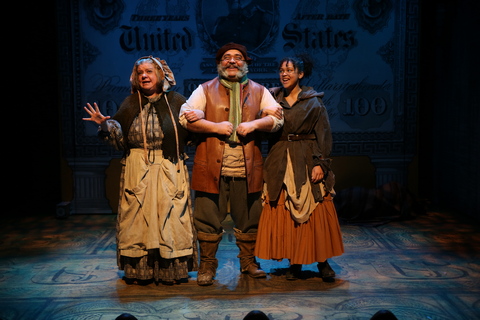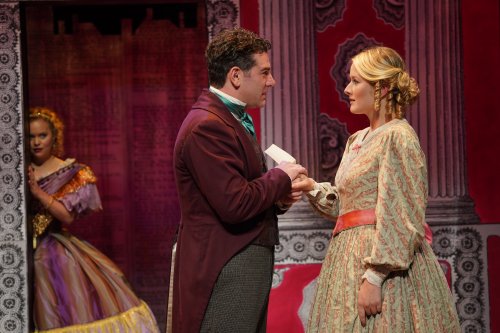The Streets of New York
The Irish Rep's Christmas story is a lot more enjoyable than the usual one.

David Hess, Amanda Jane Cooper and Price Waldman in a scene from the Irish Repertory Theatre’s production of “The Streets of New York” (Photo credit: Carol Rosegg)
‘Tis the season for the story of an elderly miser who through spiritual intervention learns to honor Christmas in his heart and keep it all the year. Of course, thanks to ubiquitous retellings, the transformative tale of Ebenezer Scrooge can often go down like warmed-over holiday stuffing. It’s also become harder not to choke on the notion that a member of the one percent would save Tiny Tim rather than pop a couple pills to chase away those meddlesome ghosts.
Cue the Irish Rep and its remounting of artistic director Charlotte Moore’s musical The Streets of New York, which the theatre first premiered twenty years ago in the aftermath of September 11. An affectionate adaptation of Dion Boucicault’s 1857 melodrama The Poor of New York, it returns in the wake of a different tragedy–a global pandemic that has claimed nearly 800,000 American lives and more than five million human beings worldwide–sharing the same social conscience as the Dickens classic but also encouraging the audience to do something more fun and cathartic: hiss at the greedy old man. Perhaps it’s the Christmas story we actually need this year.

Amanda Jane Cooper and Daniel J. Maldonado in a scene from the Irish Repertory Theatre’s production of “The Streets of New York” (Photo credit: Carol Rosegg)
Having personally witnessed the wild inequities wrought by industrial capitalism in the United States, Boucicault infused what he learned into The Poor of New York. Far from being a forerunner to Jacob Riis, however, Boucicault never let details–or concerns about character development or a logical plot or a sensible ending–get in the way of an entertaining story. Like any good melodramatist, Boucicault wanted the audience to be carried along by its emotions, and, in 1857, they were running strong because of a severe economic downturn, the kind that periodically emerges despite the caroling of the free-market faithful.
In both Boucicault’s play and Moore’s adaptation, the loudest voice in this chorus is Gideon Bloodgood (David Hess), an unscrupulous banker preparing to save his own financial neck during the Panic of 1837 by absconding to England with his depositors’ money, that is until a more convenient option presents itself: swindling a trusting sea captain (Daniel J. Maldonado) out of his substantial life savings. Even when the dupe quickly realizes his error in judgment, it turns out well for Bloodgood, as the shock of the deception causes the sea captain’s apoplectic demise. All that’s left to do is dump the body in the street, which Bloodgood handles with the help of his treacherous clerk Brendan Badger (Justin Keyes), as decidedly un-Bob Cratchit a figure as one can be. After checking off these dastardly deeds in the prologue, we’re briskly transported forward to the Panic of 1857 to see that Bloodgood has used his ill-gotten gains to become a cruel financial titan, while the sea captain’s once middle-class family is now living hand-to-mouth.

Polly McKie, Richard Henry and Jordan Tyson in a scene from the Irish Repertory Theatre’s production of “The Streets of New York” (Photo credit: Carol Rosegg)
The combining of melodrama with music has a long theatrical history (as evidenced by that Greek prefix melo-), and, so, over the last couple centuries, others have taken their shots at adding songs to Boucicault’s play. But I can’t imagine anyone doing it better than Moore. Her infectious score–beautifully rendered by the cast, music director Mark Hartman, and a tucked-away orchestra–simultaneously echoes and enhances Boucicault’s enduring insight: that the poor are always with us, because the rich are, too. And the latter will do whatever is necessary to keep it that way.
It’s a reality that makes for some great not-so-far-fetched villainy, with Moore taking satiric joy in tunefully presenting Boucicault’s three baddies: Bloodgood; his spoiled, status-obsessed daughter Alida (the hilarious Amanda Jane Cooper); and Badger, an inept, would-be blackmailer whose inconsistent morality fluctuates with the demands of the plot. The show’s best songs belong to them, particularly Cooper’s solo “Oh How I Love Being Rich,” which she performs with a superlative haughtiness that might have even turned J.D. Rockefeller into a union man. The pompous effect is aided immeasurably by one of the several ostentatious ball gowns costume designer Linda Fisher provides for Cooper.

Amanda Jane Cooper, Ben Jacoby and DeLaney Westfall in a scene from the Irish Repertory Theatre’s production of “The Streets of New York” (Photo credit: Carol Rosegg)
There’s also the vaudevillesque number “Villains,” with a charmingly choreographed soft-shoe routine by Barry McNabb, that allows Hess and Keyes to lay out all the reasons a melodrama usually succeeds on the backs of its most deplorable characters. That definitely holds true in The Streets of New York whose nobler sorts struggle a bit to hold our attention as they mix genial self-abnegation with heavy exposition. But Moore manages to enliven the proceedings substantially through a couple of amorous duets between Lucy Fairweather (DeLaney Westfall), the daughter of the long-dead sea captain, and Mark Livingston (Ben Jacoby), a formerly affluent young man who during the Panic of 1857 has fallen on hard times because of profligacy and bad investments. Predictably, their budding love is on the verge of being snuffed out by Alida’s deceitful machinations to marry Livingston and use his family name to breach whatever parts of high society bar the nouveau riche.
At times, the show evinces ambivalence about whether it is worse to be born into poverty or fall into it from a loftier perch. The sea captain’s other surviving relations, which include his ever-mourning widow Susan Fairweather (Amy Bodnar) and unemployed son Paul Fairweather (Ryan Vona), are much more dispirited than the Puffys (Richard Henry, Polly McKie, and Jordan Tyson), the perpetually destitute family who cheerily share their meager food with them. Other than stereotypes about the innately generous underclass, it’s never clear why the Puffys put up with the sponging Fairweathers. One also wonders what Bloodgood’s long-suffering butler (Price Waldman) might really think about him, but Boucicault doesn’t tell us. For him, it’s always full steam ahead with the plot.

DeLaney Westfall and Amy Bodnar in a scene from the Irish Repertory Theatre’s production of “The Streets of New York” (Photo credit: Carol Rosegg)
Moore, who also directed the production, smartly lets Boucicault’s preposterous contrivances play themselves out to the all’s-well-that-ends-well denouement, providing both the audience and the actors a lot of obvious delight. In addition to breathlessly recounted off-stage happenings, there is a tremendous onstage one, too: a massive fire collectively carried off with film serial panache by Michael Gottlieb’s infernal lighting, Hugh Landwehr’s protean set, M. Florian Staab’s vivid sound design, and a perfectly punctuating “Bwahaha!” What more could you want? Well, there’s also a final Christmastime reminder about being charitable toward the poor, which, given all the other goings-on, could easily have felt like an afterthought, but Moore won’t let it be, underscoring the altruistic message with the heartfelt closing number “Take Your Brother’s Hand.” Beseechingly sung by the entire company, it is aimed squarely at the audience, apparently in the hope that holiday transformations aren’t just a story.
The Streets of New York (through January 30, 2022)
The Irish Repertory Theatre
The Francis J. Greenburger Mainstage, 132 West 22nd Street, in Manhattan
For tickets, call 212-727-2737 or visit http://www.irishrep.org
Running time: two hours and 30 minutes with one intermission






Leave a comment